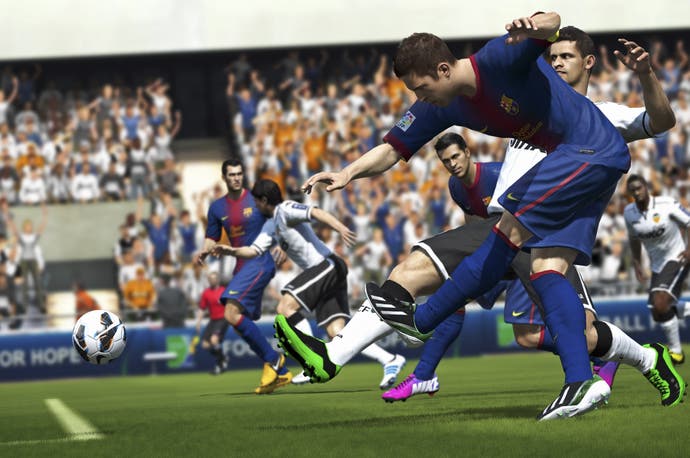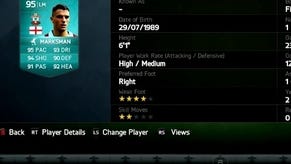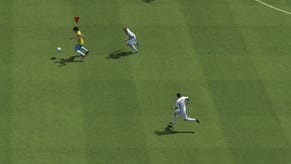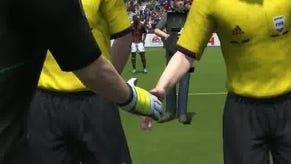FIFA 14 preview: A different game, but not necessarily a better one
The false 9.
Short-blanket syndrome: a term used to describe having inadequate resources to deal with a fixed problem. It's cold, you're in bed, your blanket is a just a bit too small. Either your feet or your shoulders will get cold. All you can do is choose which way to suffer.
I couldn't help but think of this phrase while playing FIFA 14. Hundreds of thousands of hours have been poured into the franchise to get it to the point where it stands now, and the fundamentals of the game's mechanics - the very foundations upon which this towering behemoth has been built - are resolutely fixed.
Most of these foundations, of course, are based in the rules of football themselves. Others have been found through a process of trial and error. Camera angles, instant replays, celebrations: here to stay, you would have thought. User-controlled diving, trialled in FIFA 99, didn't really work. The 'hack' button - pressing R1 to scythe down a player for an instant red card, from FIFA 2001, was quickly abandoned. FIFA International Soccer was released 20 years ago this July and, by and large, the most important parts of making a good football game have been worked out. So, in a business model where people have to buy a new game each year, what are you left with?
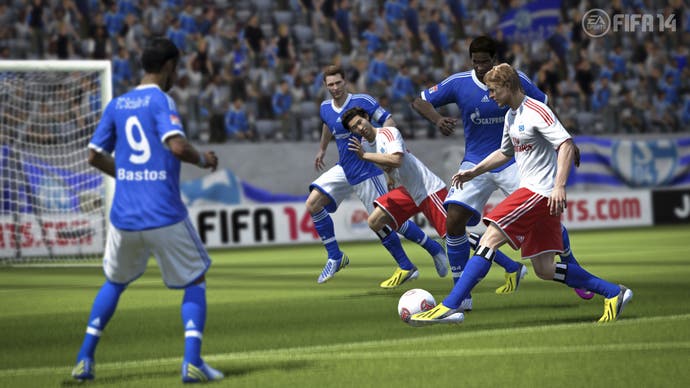
This is where the blanket comes in. EA has a fixed time-span, a fairly fixed development budget and thousands upon thousands of suggestions from superusers as to how to tweak the engine. The dynamics of the game are so complex that every tweak has repercussions, and every repercussion will prompt thousands upon thousands of suggestions of superusers for the next iteration. Every step forward can mean a step back everywhere else. Feet or shoulders: which to choose?
"Precision movement" was the main feature impressed on us during our Guildford press day - and was later mentioned when I spoke to producer Sebastian Enrique as the feature that he most hopes will become the game's legacy. And, well, it's about as exciting as it sounds. Extra frames of animation have been added to make switching direction more realistic - and time-consuming - and add another small slice of realism to the game's presentation.
This change to the time it takes a player to turn is a particularly interesting point. We've come a long way since Sensible Soccer, where a player will instantly change direction in response to the control pad. But how much time should it take? Five seconds, Enrique says, is the average time it takes a real-life player to stop sprinting in one direction and shift to the opposite. But in FIFA that's about how long it takes to run the length of the pitch.
Given how the five-minute halves are a fraction of the full 90 minutes we could apply that rule. Or we could use a multiple based on the scale of the players (4cm on my TV screen to Dirk Kuyt's 184cm of Dutch steel - it's pretty big). In fact there is no magic rule, the developers and producers just experiment and find what 'feels' right. Get this feeling wrong and they face a community backlash. It's an unenviable task.
"The dynamics of the game are so complex that every tweak has repercussions, and every repercussion will prompt thousands upon thousands of suggestions of superusers for the next iteration. Every step forward can mean a step back everywhere else."
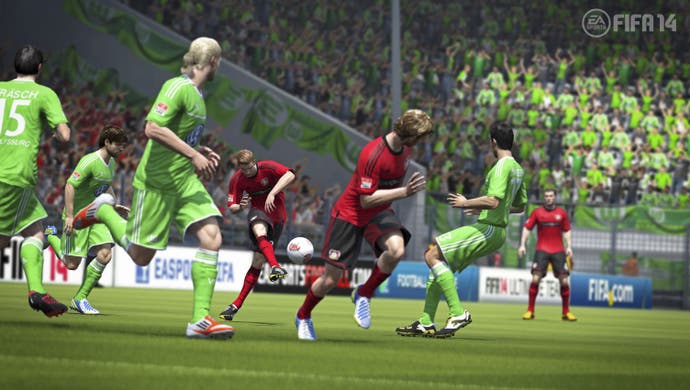
So with this new so-called "authentic motion", the blanket shifts once again. Running with the ball, for example, has become much more about control than pace, with the slower, left-trigger dribble becoming a vital part of play, even at a basic level. Building on last year's changes to first touch, you also have to take into greater consideration the player you're controlling before you decide what to do with the ball - if Jonjo Shelvey receives possession, it's probably best you just (try and) pass it.
Even experienced players will find themselves consistently running the ball out of play unless an appropriate amount of care is taken. It takes a bit of getting used to, to say the least - but does make you think more about how your team should play. Norwich and Barcelona can't use the same tactics in real life - and now they definitely can't in FIFA 14. My FIFA Seasons love-affair with Simeon Jackson is well and truly over.
As a knock-on, however, the game slows down considerably in midfield, and while the game's being sold this year partly on its embracing of playmakers like Pirlo and Xavi, I can't help but feel if this isn't quite what we want from a football game. Pirlo and Xavi are aesthetes to admire, but only a true football hipster would rather be blessed with their talents than those of either of the Ronaldos. If games are about wish-fulfillment, then Fifa should be Roy of the Rovers, not Jonathan Wilson's Inverting the Pyramid.
Add-in revamped ball-protecting and better team-mate intelligence in defence, and you essentially have a game that rewards patient, possession-based play much more than in recent years. As an impatient player who's relied on chipped through-balls and constantly holding down right-trigger for the past decade, I have mixed feelings about this. If you're prepared to put in the time, I'm sure it would be hugely rewarding to learn to get your Norwich team playing tiki-taka. But should a game like FIFA, with such a large, and largely casual audience, demand such an effort? Perhaps that's a debate for another day.
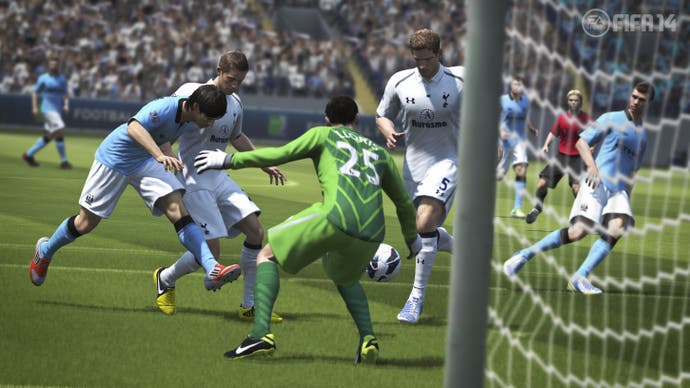
Shooting, however, is one improvement I can be unequivocal about. The disappointing clunk of a poorly-hit shot from range, arrowing its way directly into a keeper's arms with exactly the same flat trajectory, is a frustration that's run throughout this generation of releases. Now, as in real-life (particularly if your name is Dirk) you're unlikely to hit the same kind of shot twice.
"Real Ball Physics" as it's so neatly called by EA, means trajectories vary in a way they never have before, and dipping and swerving howitzers become a regular occurence. Put simply: shooting from range is fun again. And while the downside of this improvement will be that some players will start taking more random potshots than a certain coiffured Portuguese winger, it does inject some much-needed excitement into gameplay that, from my brief time with admittedly unfinished code, could perhaps get a bit laborious.
In a nutshell we're left with a game in which defending is a little easier, working the ball through midfield is a little more difficult, and shooting is quite a bit more fun. A slower game that rewards patience. Not a better game, perhaps, but a different one. And, until EA get a bigger blanket, perhaps that's all we can really ask for.
